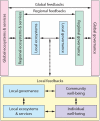Science for managing ecosystem services: Beyond the Millennium Ecosystem Assessment
- PMID: 19179280
- PMCID: PMC2635788
- DOI: 10.1073/pnas.0808772106
Science for managing ecosystem services: Beyond the Millennium Ecosystem Assessment
Abstract
The Millennium Ecosystem Assessment (MA) introduced a new framework for analyzing social-ecological systems that has had wide influence in the policy and scientific communities. Studies after the MA are taking up new challenges in the basic science needed to assess, project, and manage flows of ecosystem services and effects on human well-being. Yet, our ability to draw general conclusions remains limited by focus on discipline-bound sectors of the full social-ecological system. At the same time, some polices and practices intended to improve ecosystem services and human well-being are based on untested assumptions and sparse information. The people who are affected and those who provide resources are increasingly asking for evidence that interventions improve ecosystem services and human well-being. New research is needed that considers the full ensemble of processes and feedbacks, for a range of biophysical and social systems, to better understand and manage the dynamics of the relationship between humans and the ecosystems on which they rely. Such research will expand the capacity to address fundamental questions about complex social-ecological systems while evaluating assumptions of policies and practices intended to advance human well-being through improved ecosystem services.
Conflict of interest statement
The authors declare no conflict of interest.
Figures




Comment in
-
Interdisciplinary research for managing ecosystem services.Proc Natl Acad Sci U S A. 2009 Feb 3;106(5):1301-2. doi: 10.1073/pnas.0812580106. Epub 2009 Jan 28. Proc Natl Acad Sci U S A. 2009. PMID: 19179277 Free PMC article. No abstract available.
References
-
- Liu J, et al. Complexity of coupled human and natural systems. Science. 2007;317:1513–1516. - PubMed
-
- Kates RW, et al. Environment and development: Sustainability science. Science. 2001;292:641–642. - PubMed
-
- Carpenter SR, et al. Millennium Ecosystem Assessment: Research needs. Science. 2006;314:257–258. - PubMed
Publication types
MeSH terms
LinkOut - more resources
Full Text Sources

